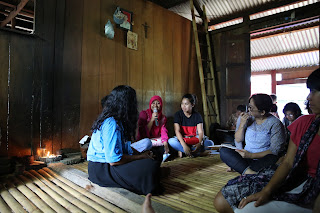“Come on, come up and show us your idea” says Sulastri with a beaming smile. The rain is beating down heavily outside the blue tarpaulin, but the 40 or so young people gathered together beneath it weren’t put off. Neither were the many other community members surrounding the excited group, watching the events unfold. Up came Sindi to tell her peers and parents about the water tank plan, her group’s suggestion to help their village.
 |
| Sindi presents the water tank design. © UNICEF Indonesia / 2016 |
Indonesia is a diverse country, where natural disasters happen frequently, and range from local flooding to devastating earthquakes. In many areas, natural disasters are fairly small scale, and it is often hard to predict what will happen and when. UNICEF is working with Adolescent Circles, often housed in Village or Town Child Forums, such as Sulastri’s group to find out more about how these issues affect children and to develop new ideas for what might be done about them.
There are a number of child forums running in Ende, on Flores Island, all run by young volunteers like Sulastri, and all have been invited today to share the ideas they’ve been developing.
To begin with, the facilitators talked to the children about what they meant by ‘natural disaster’ and they soon realised that they would need to broaden their own interpretation of the words. “At first they didn’t understand what we meant, they thought we were talking about ‘total disaster’ says Indah, a facilitator from another group. Most of the children hadn’t experienced something like this. In fact, Indah’s village last experienced a large scale disaster in 1992, long before any of the children were even born.
Many of the conversations then led to how the natural environment impacts on the families’ lives. “When there’s flooding, sometimes it means our parents can’t go to the field, or we can’t go to school for a day.” says a girl from the local group, dressed in traditional clothes woven by her mother. But the flooding wasn’t seen as being too disruptive to daily lives. “They were not worried about flooding!” says Sulastri “that’s what they see every day!”
 |
| Children take part while the rest of the community looks on. © UNICEF Indonesia / 2016 |
On the contrary, many groups, including Sulastri’s and Indah’s realised that the problems started when the rainy season ended. “We realised that in the dry season was when the children saw issues.” Says Deni, who works with Indah as a facilitator of the same group. “There wasn’t enough water, everything was drying up.” So that’s what they started from, and together they brainstormed solutions.
In Sulastri’s group, the children concluded that they needed to design a tank for water storage. In dry season, there’s very little water available, and there are times when the water they do have access to is just too dirty. “We need the tank so that we can all get clean water if there’s a flood!” Sindi explains to the crowd, many of whom are nodding in agreement because they know these solutions need to be found and are inspired by the children’s ideas.
 |
| Facilitator Sulastri talks about her group's design for a village water storage tank. © UNICEF Indonesia / 2016 |
Indah and Deni’s group also looked to the issue of where the much needed water comes from. The group brainstormed ideas and then collectively agreed that the most important issue was lack of water. “We’re still using river water!” says Indah “Let’s find a new water source!” This group’s presentation was of a complicated system of laying new water pipes to connect the village to the mountain source nearby. Their suggestion is still in its infancy, and needs support from the community and the government, but also ideas about viability.
Fortunately the presentation was a great opportunity to seek opinions – a member of the local government was in the audience and stood up to respond to their ideas. “This mountain is the biggest resource for drinking water in the area, but it’s a long way away. There is indeed still a lot of water that doesn’t come down to this village yet” he said, giving the group hope that they have started on the right path…Now they just need to work out how to turn it into a solution.
“Young people can become very important role models.” Says Indah, inspired by their enthusiasm and realising that she too can have a larger role. “Actually my older sibling is a village leader, and so I have started to share their ideas with him and see if we can gain more support.”
 |
| Children from Ende gather together to share ideas to improve their villages. © UNICEF Indonesia / 2016 |
The day’s event is a celebration of what has been achieved so far, but it is also a chance to reflect and learn from each other, and not just for the young people themselves. The facilitators are all excited about what else they might be able to achieve with their groups, and full of ideas about how to further engage the young people, and learn more from them.
